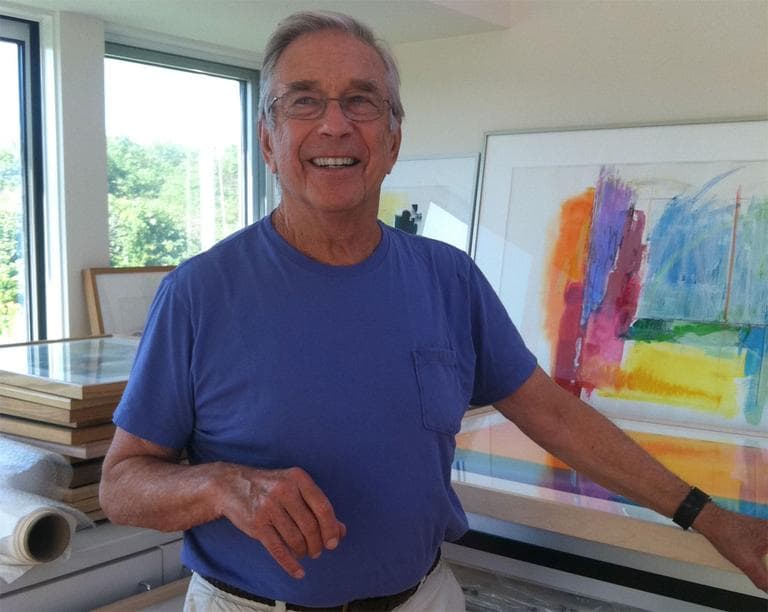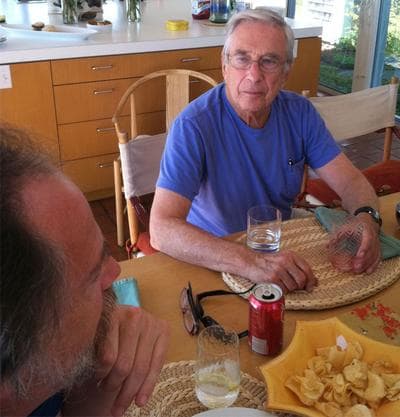Advertisement
On The Vineyard, Men Who Don't Grieve On An Island
Resume
Dealing with the death of a spouse or long time partner is overwhelming and it's often a different experience for men than it is for women.
That's what Sam Feldman discovered when he lost his wife in November 2008. Sam and his wife, Gretchen, lived year-round on Martha's Vineyard after Sam retired. When Gretchen died, Sam looked for help to deal with his deep despair. What he found were groups of women willing to share their emotions about loss but a lot of men like him were quietly trying to cope on their own.
So Sam started a bereavement group, just for men. There are no professionals involved — just a peer led group that now meets every other week. The men say their bond is what's helped them heal. We sat down at a table in Sam's living room to hear their stories:
SAM FELDMAN: We built our house here in 1986 and '87, and we had a wonderful life here for many years. My wife was an artist and she loved the beauty of the Vineyard. We just nested together on this lovely island and had a wonderful relationship.
CHRIS MARA: I'm 49 years old, I lost my wife in April of 2007 to cancer. For my wife it was her second marriage, for me it was my first. She was 10 years older than me.
FOSTER GREENE: My wife got ALS, which is Lou Gehrig's disease, and when she got this terrible diagnosis, [she] decided that she wanted to die out here — and out we came.
JAY McGURREN: I'm 67 years old, I met my wife in 1961 and we had a pretty great life. I lost my wife in November in a tragic accident. What I did was immediately try to find a group to get involved with and I ended up in a group and it was all women. It didn't really work for me.

FOSTER: Men talk to each other I think in a different way than when women are around and women I think talk to each other in a different way when men are around.
CHRIS: You know, from an early childhood where you're playing with other little boys, you learn that if you cry, you're weak. But among men who share an experience, it's a little more acceptable.
FOSTER: I think our wives would be very surprised how dark a cloud we went into. I mean, I, myself, sort of like Sam, I've always been an outgoing, extroverted person, I was in sales for my whole career and for me to go into a funk is very, very unusual, I'm always an upbeat, optimistic person and I think she would have been absolutely amazed that I got so down in the dumps.
CHRIS: The dark cloud, it's a real thing that really exists. You sort of just go through the motions of functioning. For the first year, you're sort of not all there. Then about a year and a half is when I started coming to the meeting. Still, you're not out of it. And Sam's wife was only gone about six months then. So Sam was still in it.
FOSTER: The hardest part is none of us expected to outlive our wives. We've all been trained and all of us were told that our wives, women, live longer than men. What you miss is just the everyday-ness of it, you know, "How did your job go today?"
That's the hard part and the very different part and you don't really realize it until it's gone but all of the sudden you've got to know how to use a washer and dryer and you've got to pay bills and you've got to do all this stuff. You know, every couple has got their "what he does" and "what she does" and all of the sudden it's all you.
JAY: People sometimes ask you, you know, "What are you doing?" And a lot of my life is spent trying to keep everything going at the house, shopping, I do enjoy cooking, but I sure don't like to cook every meal and you sure don't like to cook every meal for yourself, to go through that drill — it's not easy.
FOSTER: I, to this day, don't understand how my wife ever did it all.
JAY: They do the kids, really.
FOSTER: Do the kids, and put up with me, too.
SAM: Now one of the questions that we all deal with is, does meeting every other week and frequently hearing new stories of people's grief, does that help you in your healing or does that elongate your healing and make it worse for you? And on balance, I think it helps you tremendously.
Yeah, I feel lousy sometimes after the meeting, but it's overcome by feeling good that we have helped somebody else tremendously who's come in after his wife died three weeks ago, four weeks ago, five weeks ago, and they are really feeling bad — in a funk, semi-suicidal, black cloud — and they come out of here knowing that they're not alone. That is a fabulous reward for most of us who are here.
Many of the men in the bereavement group have entered into new relationships in the months and years since they've lost their wives. Jay, whose wife died in a tragic accident, is now engaged to be married. They all say the group has let them move on with their lives.
Sam has taken the model from the Vineyard group to build the Men's Bereavement Network, which has helped establish similar groups around the country.
This program aired on August 19, 2011.